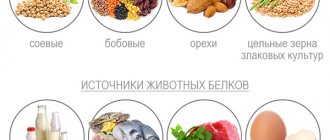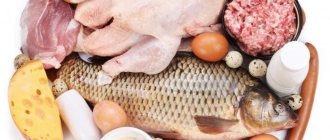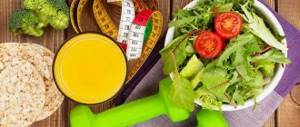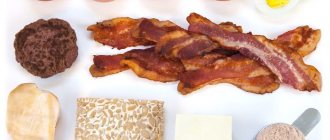An important part of any person’s diet are foods containing carbohydrates. Not only fats and proteins, but also carbohydrates take an active part in the metabolic processes occurring in the body. If a person feeds his body with proteins, fats and carbohydrates in the right quantities and in a balanced manner, then he can forget about serious metabolic disorders once and for all!
Carbohydrates are the main source of energy! They take part in the breakdown of fats and the structure of membranes at the cellular level, stimulate brain function, promote the synthesis of nucleic acids and amino acids, help the body cleanse itself of toxins and waste, protect it from many types of bacteria and viruses, and strengthen the immune system.
But not all foods containing carbohydrates are beneficial for our body. What plant foods contain carbohydrates that are beneficial for the human body? What types of carbohydrates exist and how do they differ from each other? Today we will try to find answers to these and many other questions regarding carbohydrates!
How Carbohydrates Work
There are now several scientific opinions on how exactly carbohydrates contribute to weight gain. For example, there is the insulin hypothesis of Gary Tabus, outlined in his book “Why We Get Fat”; it has supporters and critics.
But one thing is absolutely clear: if you reduce the number of carbohydrates in your diet, weight loss is inevitable. After all, carbohydrates are “fuel” for the body: during the process of metabolism, they are converted into glucose, a source of energy.
However, it is impossible to completely eliminate carbohydrates from the diet, since they are necessary for normal metabolism. It is necessary to arrive at the correct proportion of substances consumed:
General basic requirement (for the average person, without high physical activity) - 2000 kcal per day
To make your diet balanced, enter everything you eat for the day into a calorie calculator and look at the total calorie content and the ratio of proteins, fats and carbohydrates. Determine what exactly is causing the imbalance in the required proportion: perhaps you eat too many sweets and not enough meat and eggs. Think about how to change your usual diet.
At the same time, not only the quantity of carbohydrates is important, but also their quality: beans and chocolates contain an equal amount of carbohydrates, but sweets lead to weight gain, while beans do not. The fact is that these products contain different types of carbohydrates: “fast” and “slow”.
Carbohydrate content of fruits and vegetables
Table of carbohydrate content in products from the category - fruits and vegetables. The chart shows the percentage of carbohydrates from the daily requirement, calculated based on a 100 g portion of the product.
| № | Amount of carbohydrates | Share of daily value per 100 g | |
| 1 | Dried bananas | 88.3 g | 28,5% |
| 2 | Potato starch | 83.1 g | 26,8% |
| 3 | Seedless raisins | 79.5 g | 25,7% |
| 4 | Dried goji berries | 77.1 g | 24,9% |
| 5 | Dates Deglet nur | 75.0 g | 24,2% |
| 6 | Dates Majul | 75.0 g | 24,2% |
| 7 | Ginger extract powder | 71.6 g | 23,1% |
| 8 | Hot chili peppers dried in the sun | 69.9 g | 22,5% |
| 9 | Dry chickpeas | 63.0 g | 20,3% |
| 10 | Dried apricots | 62.6 g | 20,2% |
| 11 | Fresh tamarind | 62.5 g | 20,2% |
| 12 | Fenugreek seeds | 58.4 g | 18,8% |
| 13 | Soybean cake | 35.9 g | 11,6% |
| 14 | Taro cooked tubers | 34.6 g | 11,2% |
| 15 | Fresh persimmon | 33.5 g | 10,8% |
| 16 | Raw garlic | 33.1 g | 10,7% |
| 17 | Fresh black persimmon (sapota) | 32.1 g | 10,4% |
| 18 | Fresh plantains | 31.9 g | 10,3% |
| 19 | Prunes | 28.1 g | 9,1% |
| 20 | Boiled pink beans | 27.9 g | 9,0% |
| 21 | Yams cooked | 27.5 g | 8,9% |
| 22 | Boiled chickpeas | 27.4 g | 8,8% |
| 23 | Fresh breadfruit | 27.1 g | 8,7% |
| 24 | Fresh sprouted peas | 27.1 g | 8,7% |
| 25 | Durian fresh | 27.1 g | 8,7% |
| 26 | Boiled variegated beans (Pinto) | 26.2 g | 8,5% |
| 27 | Boiled white beans | 26.1 g | 8,4% |
| 28 | French fries | 25.6 g | 8,2% |
| 29 | Soy protein (concentrate) powder | 25.4 g | 8,2% |
| 30 | Sugar apple fresh | 25.2 g | 8,1% |
| 31 | Boiled adzuki beans | 24.8 g | 8,0% |
| 32 | Boiled black beans | 23.7 g | 7,6% |
| 33 | Wasabi root raw | 23.5 g | 7,6% |
| 34 | Fresh passion fruit | 23.4 g | 7,5% |
| 35 | Boiled pigeon peas | 23.3 g | 7,5% |
| 36 | Fresh jackfruit | 23.3 g | 7,5% |
| 37 | Fresh bananas | 22.8 g | 7,4% |
| 38 | Boiled red beans (Kidney) | 22.8 g | 7,4% |
| 39 | Fresh sprouted lentils | 22.1 g | 7,1% |
| 40 | Baked potatoes | 21.6 g | 7,0% |
| 41 | Roasted peanuts | 21.3 g | 6,9% |
| 42 | Boiled burdock root | 21.2 g | 6,8% |
| 43 | Peas boiled in water (ripe) | 21.1 g | 6,8% |
| 44 | Boiled corn | 21.0 g | 6,8% |
| 45 | Rambutan canned | 20.9 g | 6,7% |
| 46 | Boiled black-eyed beans | 20.8 g | 6,7% |
| 47 | Jujube (Chinese date) fresh | 20.2 g | 6,5% |
| 48 | Lentils boiled in water | 20.1 g | 6,5% |
| 49 | Raw sweet potato | 20.1 g | 6,5% |
| 50 | Boiled potatoes | 20.0 g | 6,5% |
| 51 | Sapodilla fruits fresh | 20.0 g | 6,4% |
| 52 | Boiled beans (ripe) | 19.7 g | 6,3% |
| 53 | Fresh figs | 19.2 g | 6,2% |
| 54 | Boiled mung bean | 19.2 g | 6,2% |
| 55 | Fresh pomegranate | 18.7 g | 6,0% |
| 56 | Raw corn | 18.7 g | 6,0% |
| 57 | Amaranth grains cooked | 18.7 g | 6,0% |
| 58 | Salsify (salf's root) raw | 18.6 g | 6,0% |
| 59 | Fresh elderberry | 18.4 g | 5,9% |
| 60 | Grapes (red or green) fresh | 18.1 g | 5,8% |
| 61 | Parsnip root raw | 18.0 g | 5,8% |
| 62 | Raw ginger root | 17.8 g | 5,7% |
| 63 | Cherimoya fresh | 17.7 g | 5,7% |
| 64 | Chicory root, raw | 17.5 g | 5,6% |
| 65 | Raw potatoes | 17.5 g | 5,6% |
| 66 | Jerusalem artichoke raw | 17.4 g | 5,6% |
| 67 | Fresh grape leaves | 17.3 g | 5,6% |
| 68 | Fresh soursop | 16.8 g | 5,4% |
| 69 | Mashed potatoes with milk and butter, prepared | 16.8 g | 5,4% |
| 70 | Fresh shallots | 16.8 g | 5,4% |
| 71 | Fresh lychees | 16.5 g | 5,3% |
| 72 | Peanuts raw | 16.1 g | 5,2% |
| 73 | Fresh kumquat | 15.9 g | 5,1% |
| 74 | Fresh jambolan | 15.6 g | 5,0% |
| 75 | Fresh black currant | 15.4 g | 5,0% |
| 76 | Fresh quince | 15.3 g | 4,9% |
| 77 | Fresh pear | 15.2 g | 4,9% |
| 78 | Feijoa fresh | 15.2 g | 4,9% |
| 79 | Fresh longan | 15.1 g | 4,9% |
| 80 | Mango fresh | 15.0 g | 4,8% |
| 81 | Fresh kiwi | 14.7 g | 4,7% |
| 82 | Fresh blueberries | 14.5 g | 4,7% |
| 83 | Fresh green peas | 14.5 g | 4,7% |
| 84 | Canned corn | 14.3 g | 4,6% |
| 85 | Fresh guava | 14.3 g | 4,6% |
| 86 | Fresh leek | 14.2 g | 4,6% |
| 87 | Fresh grapes (muscat varieties) | 13.9 g | 4,5% |
| 88 | Fresh apples | 13.8 g | 4,5% |
| 89 | Fresh red or white currants | 13.8 g | 4,5% |
| 90 | Fresh carissa fruits | 13.6 g | 4,4% |
| 91 | Fresh tangerines | 13.3 g | 4,3% |
| 92 | Fresh pineapple | 13.1 g | 4,2% |
| 93 | Frozen logan berry | 13.0 g | 4,2% |
| 94 | Canned green peas | 12.6 g | 4,1% |
| 95 | Fresh Antillean apricot | 12.5 g | 4,0% |
| 96 | Fresh cherries | 12.2 g | 3,9% |
| 97 | Fresh medlar | 12.1 g | 3,9% |
| 98 | Fresh clementine | 12.0 g | 3,9% |
| 99 | Fresh cranberries | 12.0 g | 3,9% |
| 100 | Boiled artichokes | 12.0 g | 3,9% |
| 101 | Fresh raspberries | 11.9 g | 3,9% |
| 102 | Fresh oranges | 11.8 g | 3,8% |
| 103 | Fresh green beans | 11.7 g | 3,8% |
| 104 | Fresh sprouted variegated beans (Pinto) | 11.6 g | 3,7% |
| 105 | Fresh plum | 11.4 g | 3,7% |
| 106 | Hibiscus flower, fresh | 11.3 g | 3,6% |
| 107 | Physalis fresh | 11.2 g | 3,6% |
| 108 | Fresh apricot | 11.1 g | 3,6% |
| 109 | Fresh papaya | 10.8 g | 3,5% |
| 110 | Fresh grapefruit | 10.7 g | 3,4% |
| 111 | Fresh lime | 10.5 g | 3,4% |
| 112 | Fresh gooseberries | 10.2 g | 3,3% |
| 113 | Boiled onions | 10.2 g | 3,3% |
| 114 | Boiled green beans | 10.1 g | 3,3% |
| 115 | Boiled beets | 10.0 g | 3,2% |
| 116 | Lupine (lupine beans) cooked | 9.9 g | 3,2% |
| 117 | Fresh mulberries | 9.8 g | 3,2% |
| 118 | Fresh pomelo | 9.6 g | 3,1% |
| 119 | Fresh blackberries | 9.6 g | 3,1% |
| 120 | Carrots raw (fresh) | 9.6 g | 3,1% |
| 121 | Prickly pear (fruit) fresh | 9.6 g | 3,1% |
| 122 | Fresh sprouted soybeans | 9.6 g | 3,1% |
| 123 | Raw beets | 9.6 g | 3,1% |
| 124 | Fresh peach, pitted | 9.5 g | 3,1% |
| 125 | Fresh onions | 9.3 g | 3,0% |
| 126 | Fresh lemon, without peel | 9.3 g | 3,0% |
| 127 | Fresh dandelion leaves | 9.2 g | 3,0% |
| 128 | Cooked cowpea (boiled) | 9.2 g | 3,0% |
| 129 | Fresh melon | 9.1 g | 2,9% |
| 130 | Fresh Brussels sprouts | 9.0 g | 2,9% |
| 131 | Edamame cooked | 8.9 g | 2,9% |
| 132 | Red hot fresh chili pepper | 8.8 g | 2,8% |
| 133 | Raw curly cabbage | 8.8 g | 2,8% |
| 134 | Cooked eggplant | 8.7 g | 2,8% |
| 135 | Raw rutabaga | 8.6 g | 2,8% |
| 136 | Avocado fresh | 8.5 g | 2,8% |
| 137 | Boiled soybeans (ripe) | 8.4 g | 2,7% |
| 138 | Boiled carrots | 8.2 g | 2,7% |
| 139 | Fresh cantaloupe melon | 8.2 g | 2,6% |
| 140 | Boiled green beans (asparagus) | 7.9 g | 2,5% |
| 141 | Soy sauce (hydrolyzed) | 7.8 g | 2,5% |
| 142 | Barbados cherry fresh | 7.7 g | 2,5% |
| 143 | Fresh strawberries | 7.7 g | 2,5% |
| 144 | Leeks cooked | 7.6 g | 2,5% |
| 145 | Kiwano fresh | 7.6 g | 2,4% |
| 146 | Fresh watermelon | 7.6 g | 2,4% |
| 147 | Fresh Suriname cherries | 7.5 g | 2,4% |
| 148 | Raw okra | 7.5 g | 2,4% |
| 149 | Fresh red cabbage | 7.4 g | 2,4% |
| 150 | Fennel, raw (fruit or root) | 7.3 g | 2,4% |
| 151 | Quinoa fresh | 7.3 g | 2,4% |
| 152 | Boiled broccoli | 7.2 g | 2,3% |
| 153 | Fresh turnip tops | 7.1 g | 2,3% |
| 154 | Boiled Brussels sprouts | 7.1 g | 2,3% |
| 155 | Starfruit (starfruit) fresh | 6.7 g | 2,2% |
| 156 | Boiled kohlrabi (cabbage) | 6.7 g | 2,2% |
| 157 | Fresh broccoli | 6.6 g | 2,1% |
| 158 | Fresh onion | 6.5 g | 2,1% |
| 159 | Raw pumpkin | 6.5 g | 2,1% |
| 160 | Turnips raw | 6.4 g | 2,1% |
| 161 | Fresh parsley | 6.3 g | 2,0% |
| 162 | Fresh kohlrabi | 6.2 g | 2,0% |
| 163 | Fresh savoy cabbage | 6.1 g | 2,0% |
| 164 | Fresh red bell pepper | 6.0 g | 1,9% |
| 165 | Fresh sprouted mung bean | 5.9 g | 1,9% |
| 166 | Naranjilla frozen | 5.9 g | 1,9% |
| 167 | Fresh vegetable physalis | 5.8 g | 1,9% |
| 168 | Fresh cabbage, white cabbage | 5.8 g | 1,9% |
| 169 | Fresh green onion | 5.7 g | 1,9% |
| 170 | Java apple fresh | 5.7 g | 1,8% |
| 171 | Cooked cabbage (boiled) | 5.7 g | 1,8% |
| 172 | Canned olives | 5.6 g | 1,8% |
| 173 | Soy sauce (tamari) | 5.6 g | 1,8% |
| 174 | Fern (shoots) raw | 5.5 g | 1,8% |
| 175 | Boiled cabbage (white cabbage) | 5.5 g | 1,8% |
| 176 | Fresh watercress | 5.5 g | 1,8% |
| 177 | Fresh kale | 5.4 g | 1,7% |
| 178 | Boiled Spanish artichokes | 5.3 g | 1,7% |
| 179 | Cooked turnips | 5.1 g | 1,6% |
| 180 | Fresh cauliflower | 5.0 g | 1,6% |
| 181 | Boiled or baked pumpkin | 4.9 g | 1,6% |
| 182 | Fresh chicory leaves | 4.7 g | 1,5% |
| 183 | Chinese fresh broccoli | 4.7 g | 1,5% |
| 184 | Green bell pepper, fresh | 4.6 g | 1,5% |
| 185 | Canned heart of palm | 4.6 g | 1,5% |
| 186 | Rhubarb stem raw | 4.5 g | 1,5% |
| 187 | Chayote raw | 4.5 g | 1,5% |
| 188 | Radicchio fresh | 4.5 g | 1,4% |
| 189 | Fermented tofu cheese (fuyu) | 4.4 g | 1,4% |
| 190 | Fresh chives | 4.4 g | 1,4% |
| 191 | Fresh beet tops | 4.3 g | 1,4% |
| 192 | Boiled cauliflower | 4.1 g | 1,3% |
| 193 | Boiled asparagus | 4.1 g | 1,3% |
| 194 | Red beans (Kidney) sprouted fresh | 4.1 g | 1,3% |
| 195 | Fresh daikon | 4.1 g | 1,3% |
| 196 | Fresh amaranth leaves | 4.0 g | 1,3% |
| 197 | Cooked tomatoes | 4.0 g | 1,3% |
| 198 | Fresh tomatoes | 3.9 g | 1,3% |
| 199 | Raw asparagus | 3.9 g | 1,3% |
| 200 | Canned green olives | 3.8 g | 1,2% |
| 201 | Chinese cooked broccoli | 3.8 g | 1,2% |
| 202 | Boiled spinach | 3.8 g | 1,2% |
| 203 | Fresh chard | 3.7 g | 1,2% |
| 204 | Raw milkweed shoots | 3.7 g | 1,2% |
| 205 | Cilantro (coriander leaves) fresh | 3.7 g | 1,2% |
| 206 | Fresh arugula | 3.7 g | 1,2% |
| 207 | Fresh cucumbers | 3.6 g | 1,2% |
| 208 | Fresh spinach | 3.6 g | 1,2% |
| 209 | Fresh radish | 3.4 g | 1,1% |
| 210 | Fresh purslane | 3.4 g | 1,1% |
| 211 | Fresh endive | 3.4 g | 1,1% |
| 212 | Cooked squash | 3.3 g | 1,1% |
| 213 | Fresh Roman salad | 3.3 g | 1,1% |
| 214 | Fresh sorrel | 3.2 g | 1,0% |
| 215 | Broccoli raab cooked | 3.1 g | 1,0% |
| 216 | Escarole cooked | 3.1 g | 1,0% |
| 217 | Fresh iceberg lettuce | 3.0 g | 1,0% |
| 218 | Fresh celery | 3.0 g | 1,0% |
| 219 | Fresh lettuce | 2.9 g | 0,9% |
| 220 | Hard tofu cheese (linen) | 2.9 g | 0,9% |
| 221 | Fresh broccoli raab | 2.9 g | 0,9% |
| 222 | Fried or baked zucchini (without oil) | 2.7 g | 0,9% |
| 223 | Sauerkraut (kimchi) | 2.4 g | 0,8% |
| 224 | Fresh pumpkin leaves | 2.3 g | 0,8% |
| 225 | Fresh red lettuce | 2.3 g | 0,7% |
| 226 | Fresh head lettuce | 2.2 g | 0,7% |
| 227 | Fresh Chinese cabbage | 2.2 g | 0,7% |
| 228 | Boiled butterbur | 2.2 g | 0,7% |
| 229 | Fresh sprouted alfalfa seeds | 2.1 g | 0,7% |
| 230 | Boiled bamboo shoots | 1.9 g | 0,6% |
| 231 | Raw beetroot | 1.3 g | 0,4% |
| 232 | Dry soy tofu cheese | 1.2 g | 0,4% |
| 233 | Soy Protein (Isolate) Powder | 0.0 g | 0,0% |
Types of carbohydrates and glycemic index
Some carbohydrates are broken down quickly, and glucose from them immediately enters the blood. If it is not spent on active mental and physical labor, then it is stored “in reserve”, forming fat deposits.
Slow carbohydrates are broken down gradually, so the energy from them is absorbed throughout the day and is not stored. Therefore, nutritionists recommend replacing fast carbohydrates in the diet with slow ones.
Each type of food rich in carbohydrates has its own rate of absorption. It's called the "glycemic index." If the index is above 70, the product is considered rich in fast carbohydrates and carries a risk of obesity. You will find examples of such products at the top of the table: white bread, fried potatoes, sugar, sweets.
To reduce body weight, nutritionists recommend replacing familiar foods with fast carbohydrates with their “slow” counterparts: for example, white bread with whole grain bread, wheat pasta with buckwheat, chocolate and other sweets with dried fruits and nuts.
What foods contain carbohydrates
Carbohydrates are organic compounds that supply the body with the energy necessary for full functioning. They are part of every tissue and cellular structure. Carbohydrates account for approximately 2.7 percent of total body weight. Without them, internal organs and systems cannot function normally. Maintaining the ratio of carbohydrates in the body becomes possible with a balanced diet, including foods containing these and other beneficial substances.
What role do carbohydrates play in the body?
To understand why these organic compounds are so important, it is necessary to study their functions. Carbohydrates that enter the body with food have the following range of actions:
- They supply energy resources to the human body. This occurs due to the oxidation of the compound. As a result of this process, one gram of carbohydrate produces 17 kilojoules or 4.1 calories. Oxidation is accompanied by the consumption of either glycogen (a reserve reserve of carbohydrates) or glucose.
- They take part in the formation of various structural units. Thanks to carbohydrates, the body builds cell membranes, produces nucleic acids, enzymes, nucleotides, and so on.
- Form energy reserves for the body. Carbohydrates, taking the form of glycogen, are deposited in muscle and other tissues, and the liver.
- They are anticoagulants. These substances thin the blood and also prevent the formation of blood clots.
- They are part of the mucus lining the gastrointestinal tract, the surfaces of the respiratory and genitourinary systems. By covering these internal organs, mucus resists viral and bacterial infections and provides protection from mechanical damage.
- They have a positive effect not on digestion. Carbohydrates stimulate the function of digestive enzymes, and, therefore, improve digestive processes and the quality of absorption of nutrients and valuable substances, and activate gastric motility.
In addition, these organic compounds increase the body’s protective functions, determine blood type, and also reduce the likelihood of developing cancer pathologies.
Types of carbohydrates
Organic substances from the carbon group are divided into two large groups - simple and complex. The former are also called fast or easily digestible, and the latter - slow.
Simple carbohydrates
They have a simple composition and are quickly absorbed in the body. This feature of carbohydrate leads to a sharp increase in blood glucose. The body's reaction to the consumption of simple carbohydrates is a large release of insulin, the hormone responsible for the production of pancreas.
The sugar level under the influence of insulin decreases below the standard norm. Thus, a person who has recently eaten foods rich in simple carbohydrates begins to feel hungry quite quickly. In addition, the conversion of sugar molecules into subcutaneous fat occurs in a ratio of one to two.
Products containing a lot of simple carbohydrates (about 50g or more per 100g of product)
Sweet:
sugar, candy, honey, chocolate, jam, cookies, dried fruits (raisins, figs, dates, pineapple, etc.), halva, condensed milk.
Bakery:
waffles, gingerbread, cakes, crackers, rolls, semolina, pasta, white bread.
If a product contains sugar and/or flour, it can be classified as fast carbohydrates.
Products containing a lot of simple carbohydrates can be safely excluded from the diet for both those losing weight and athletes. Replace them with healthy foods containing simple carbohydrates in moderation.











